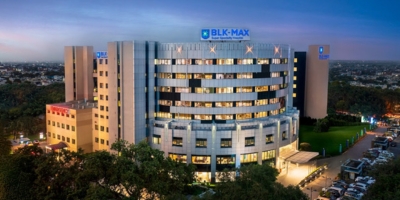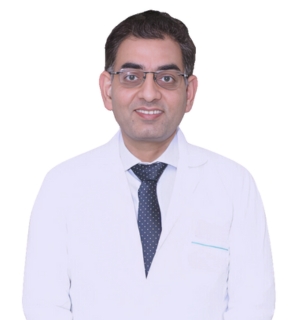Surgery for Oral Cancer in India: Guide to Cost, Hospital & Surgeon
Get surgery for oral cancer in India at top hospitals. Learn about low treatment costs, skilled surgeons, and the success rate of oral cancer in India.
Fight cancer today!
What Is the Cost of Surgery for Oral Cancer in India?
The cost of oral cancer surgery in India is around $5000. At the same time, the surgery cost in the USA starts at $17,000[1].
The cost of treatment is higher for advanced stages of oral cancer, as they often require pre-treatment with radiation and chemotherapies.
Here’s a quick snapshot of the cost of surgery in India and the USA:
| Cost of surgery in India (in USD) | Cost of surgery in the USA (in USD) |
| $5000 | $17,000 onwards |
The cost in India includes:
- Surgical treatment
- All tests, including blood and gene tests
- Stay and meals as per treatment plan (only for specific time)
- Medications
- Consultation from the primary team
The cost does not include anything that is out of the treatment plan scope.
Looking to get cancer surgery in other countries? Read Cancer Treatment Abroad and find the best countries with affordable and safe cancer treatment.
Cost of Alternate Treatments for Oral Cancer
Besides surgery, other treatment options for oral cancer include:
- Radiation therapy: This therapy uses external energy beams or radioactive materials placed inside the body, called brachytherapy, to kill cancer cells. Radiation therapy may be used before surgery to destroy cancer cells and shrink the tumor, making it easy for surgical removal. When used after surgery, it is done to kill any remaining cancer cells.
- Chemotherapy: This systemic therapy uses anticancer drugs to destroy or kill cancer cells. Cisplatin and fluorouracil are common chemotherapeutic drugs used in the treatment of oral cancer.
- Immunotherapy: This type of biological therapy uses medicines and therapy to stimulate and boost the individual’s immune system, allowing it to find and destroy cancer cells effectively.
|
Treatment |
Cost of Treatment in India (in USD) |
Cost of Treatment in the USA (in USD) |
| Chemotherapy | Starts at $250 - $300 | Around $9,000- $12,000[2] |
| Radiation therapy | $4400 - $6500 | $ 52,034[3] |
| Immunotherapy | Starts at $1200 and goes upto $85000 | Starts at $15,000 and can go up to $400,000 |
Know the complete guide to Immunotherapy for Oral Cancer in India here!
Procedure
Surgery is usually the first line of treatment for oral cancers. Surgery aims to remove the entire cancerous tissue while preserving surrounding structures, physical appearance, and the ability to speak and swallow. Oral cancer surgery is performed under general anesthesia and requires a hospital stay.
Types of Surgery
There are different types of surgery for oral cancer. Some of these include:
- Resection: The surgeons remove the tumor and the surrounding healthy tissue margin. This is done to reduce the risk of recurrence.
- Mohs micrographic surgery: This technique is used for lip cancers. During this procedure, the upper layer of the tumor is removed and checked for abnormal or cancerous fat cells. The procedure continues until the surgeon reaches a layer without cancer cells.
- Glossectomy: When oral cancer affects the tongue, a glossectomy is performed.
- Mandibulectomy: This surgery is done to remove the part of the complete lower jaw affected by cancer.
- Maxillectomy: The surgeon removes a part of the complete soft palate (roof of the mouth).
- Oral reconstruction surgery: When functional structures of the head and neck region, like the jaw, are removed during oral cancer surgery, they are reconstructed to restore form and function.
- Robotic surgery: It is a minimally invasive advanced surgery in which the surgeon performs the surgery remotely with the assistance of robots. The surgeon controls the robotic arm, allowing them to perform the surgery precisely.
Want to know more about surgery as a treatment option in India for other types of cancers?
Read our blogs on Surgery for Breast Cancer in India and Surgery for Lung Cancer in India right here.
Precautions and Preparations Before the Surgery
Before you undergo surgery for oral cancer, there are a few things your doctor will advise you to do to prepare for it.
- Check your fitness for surgery
Your surgeon will prescribe a few tests before the surgery to check your fitness for anesthesia. They will also recommend a few other tests:
- Routine blood tests
- An ECG to check if your heart is healthy
- Lung function tests
- A chest x-ray to ensure your lungs are healthy
- A stress test to check your heart and lung function when resting and during exercise
- Lifestyle modifications
Before and after your oral cancer surgery, your doctor may advise the following measures:
- Quit smoking and consumption of alcohol. Smoking after surgery has been found to increase pain and difficulty in mouth opening.[4]
- Exercise for atleast 30 minutes a day daily. Several studies have examined how physical activity and exercise among people with oral cancer help reduce fatigue and anxiety.[5]
- Perform stress-busting activities like meditation or yoga to calm your mind.
- Removal of teeth and planning replacement
If the oral cancer surgery is going to cause the removal of a significant part of the jaw or cause a loss of teeth, you may require implants or dentures to replace the missing teeth. Your surgeon will discuss the rehabilitation plan before the surgery.
Recovery After Oral Surgery
You will be required to stay at the hospital for a few days after surgery to recover. Your stay at the hospital depends upon the extent of surgery and what part of the oral cavity was removed. However, it may take several weeks for you to recover completely.
You will be prescribed medications to help minimize pain and discomfort. Diet, speech, and swallowing may be affected depending on the part of the oral cavity that has been operated on.
Side Effects of Oral Surgery
Common side effects of oral cancer surgery include[6]
- Pain
- Swelling
- Bleeding from the surgical site
- Bloated face
- Difficulty in eating
- Numbness in the ear, weakness in the shoulder or lower lip (if lymph nodes have been removed during surgery)
Overview of Oral Cancer
Oral cancer affects the mouth, back of the throat, and nearby structures. Cancer can develop on the tongue, cheek, lining of the mouth, on and under the tongue, roof, and floor of the mouth. It is the 6th most common cancer worldwide.[7]
Oral cancer, also called mouth cancer, is a type of head and neck cancer. It usually begins in the flat cells found in the lining of the mouth, tongue, and lips. Most oral cancers are squamous cell cancers (they begin on the lining of the structures in the mouth).
While anyone can develop oral cancer, they are more common in males.[8]
Surgery is the primary treatment for early-stage oral cancers and often the only treatment required. The type of surgery depends upon the extent of the cancer and its location in the mouth.
Surgery for oral cancer aims to remove the cancer completely, with minimal damage to speech, swallowing, or facial structure and appearance.
During the surgery, the surgeon removes the cancerous part, along with surrounding healthy tissue, to ensure no cancer cells remain behind to cause a recurrence. If the surgeon suspects the cancer cells have affected the lymph nodes, they are also removed during the surgery. This is called a neck dissection.
India & Oral Cancer: Research to Tackle the Problem
Oral cancer is the 6th most common cancer worldwide.[9] Despite having 1/3rd of the global cases of oral cancer, India has made significant progress in detection and affordable treatment, making it the preferred destination for treatments.
In one of the latest developments, researchers in India have observed that all cancer patients do not respond the same way to oral cancer treatment, indicating that there may be a genetic component involved. This was studied jointly by scientists at the National Institute of Biomedical Genomics and doctors at R. Ahmed Dental College, Kolkata, and published in the journal Cancer Science.[10]
Success Rate of Surgery for Oral Cancer in India
The success rate of surgery for oral cancer in India is over 90% when diagnosed early.[11]
While the survival rate is dependent upon many factors, such as the age of the patient and the stage of cancer at the time of diagnosis and beginning of treatment, experienced doctors and affordable tertiary care have improved the success rate of surgery for oral cancer in India. Surgery with radiotherapy was found to be more beneficial than surgery alone.
Best Hospital for Surgery for Oral Cancer in India.

JCI-accredited, it is one of the largest private hospital. It ranks among the top 10 multi-specialty hospitals.
Dedicated services for medical tourists from over 100+ countries.
It serves local and international patients, specializing in orthopedic treatments, cancer, bariatric surgery, and cardiology with advanced, European-standard equipment.
- 60+ Years of Experience
- JCI Accredited
- NABH Accredited
- Advanced technology medical oncology like immunotherapy, targeted therapy and chemotherapy
- Leading medical oncology specialists with organ-specific expertise
- Round-the-clock critical care with OPD services, which are designed for an organ-specific approach

NABH-accredited, this hospital is a renowned 250-bed hospital in New Delhi.
The hospital is well-equipped with Tesla MRI and Cath Labs and 50+ critical beds. With this, it offers Orthopaedics, Cardiology, Urology, Neurology, Paediatrics, Obstetrics, and Gynaecology.
- NABH Accredited
- 300+ Doctors
- 22+ Departments
- JCI-accredited with high-tech equipment like Da Vinci Robot, Novalis Tx for IMRT/IGRT, Radiosurgery, HIPEC and SRS/SRT for oncology care
- Pioneers in all kinds of cancer treatment, including immunotherapy, hormone therapy and stem cell transplant
- Highly skilled oncology team, including specialists with over 4 decades of experience
Best Specialist for Surgery for Oral Cancer in India.

Dr. Surender Kumar Dabas( BLK-Max Super Speciality Hospital )
With over 20,000 robotic surgeries, Dr. Dabas is a renowned cancer surgeon, trained at the University of Chicago.
He specializes in surgical oncology and mentors surgeons globally to advance innovative cancer treatment techniques.
Education
- Maulana Azad Medical College, New Delhi.
- Lady Hardinge Medical College, New Delhi.
- National Board of Examination, India.
Memberships
- International Guild of Robotic & Endoscopic Head & Neck Surgery
- Indian Association of Surgical Oncology
- Robotic & Endoscopic Head - Neck Surgeons
Why MTC Partners for Oral Cancer Surgery?
MTC partners with some of India's top hospitals and the best surgeons for oral cancer to provide the best possible treatments.
- Our surgeons have 20+ years of experience treating different types of oral cancers.
- Our partner hospitals have cutting-edge diagnostic technology, such as tomotherapy, robotic surgery, and true beam linac.
- Diagnosis is at the forefront of oral cancer treatment, and our partner hospitals use advanced diagnostic tools like fine needle aspiration cytology (FNAC), fiber optic nasopharyngoscopy, and pan endoscopy.
- We work with a multidisciplinary team of oral cancer specialists to provide targeted and personalized treatments
Conclusion
Get Surgery for oral cancer in India as your first line of treatment.
Meet experienced oral surgeons and find advanced diagnostic tools & techniques, such as true beam lilac, at affordable rates.
Connect with our team.
Is Surgery for Oral Cancer Safe in India?
Surgery for oral cancer in India is a safe procedure. However, individuals with advanced stages of the disease may develop complications, which may affect the survival rate.
FAQs
The survival rate of oral cancer in India is 90% if diagnosed early.[12]
Oral cancers in certain regions, like the tongue, can spread rapidly.[13] These cancerous lesions are asymptomatic initially but can advance quickly. Every year, 3% to 7% of oral squamous cell carcinomas spread to other locations.[14]
References
- PubMed Central: The Economic Burden of Head and Neck Cancer: A Systematic Literature Review
- University of Rochester Medical Center: Oral Cancer: Surgery
- American Association of Cancer Research: Oral Cancer Prevalence, Mortality, and Costs in Medicaid and Commercial Insurance Claims Data
- National Library of Medicine: Oral Cancer
- Deccan Herald: Indian scientists peep into individual oral cancer cells
- Ministry of Health and Family Welfare, Government of India: Integrated Health Information Platform
- Cureus: Rapidly Growing Squamous Cell Carcinoma of the Tongue
- Oral oncology: Overview of oral cavity squamous cell carcinoma: Risk factors, mechanisms, and diagnostics



